This article was medically reviewed by Tu Anh Vu, DMD. Dr. Tu Anh Vu is a board certified dentist who runs her private practice, Tu's Dental, in Brooklyn, New York. Dr. Vu helps adults and kids of all ages get over their anxiety with dental phobia. Dr. Vu has conducted research related to finding the cure for Kaposi Sarcoma cancer and has presented her research at the Hinman Meeting in Memphis. She received her undergraduate degree from Bryn Mawr College and a DMD from the University of Pennsylvania School of Dental Medicine.
There are 11 references cited in this article, which can be found at the bottom of the page.
This article has been viewed 41,037 times.
Sore gums can be annoying and painful, making it hard for you to chew food and talk. You can develop this issue due to gingivitis, an inflammation of the part of your gums that surround your teeth. In some cases, diet and poor oral hygiene can make your gums irritated and inflamed. To treat sore gums, make lifestyle and diet changes, and apply natural remedies. You can also see your dentist for a teeth cleaning and other treatments for the issue.[1]
Steps
Making Lifestyle and Diet Changes
-
1Apply a cold or warm compress. Take a clean cloth and soak it in warm water. Wring it out and hold it against your face over the sore area for five minutes. The heat will help to soothe the area.[2]
- Use a cold compress by using an ice pack or a small bag of frozen peas. Wrap the ice pack in a towel and hold it against your face over the sore area for 1-2 minutes. The cold compress will help to reduce swelling and inflammation.
- Apply the cold or warm compress several times to help reduce discomfort in your gum area.
-
2Brush your teeth with a soft bristle brush, avoiding the gum area. Sore gums can be a symptom of gingivitis, which is caused by poor oral hygiene. Try brushing your teeth with fluoride toothpaste to treat the gingivitis. Use a soft bristle brush and be sure to brush your teeth well. Brush gently around your gumline, so as not to irritate your gums further.[3]Advertisement
-
3Eat cold foods. Have a freezer pop, a scoop of ice cream, or some frozen grapes. Cold foods can help to soothe your sore gums.[6]
- Jello, pudding, and cold soup are also good options.
-
4Avoid sharp, crunchy foods. Sharp, crunchy foods can irritate your sore gums more and make them more swollen. Avoid foods like chips, nuts, and toast.[7]
-
5Take over-the-counter pain medication. If your sore gums are painful, take pain medication like ibuprofen or acetaminophen.[8] Follow the dosage instructions on the label and do not take more than recommended.[9]
- If your sore gums still feel painful despite the pain medication, or the pain does not go away after a few days, go see your dentist for treatment.
Applying Natural Remedies to Your Gums
-
1Do a salt water rinse.[10] Salt can help to heal your sore gums and prevent bacteria from building up in your mouth, which can make your sore gums worse. Mix 1⁄2 teaspoon (2.5 ml) salt in a glass of lukewarm water. Then, rinse your mouth with the salt water 2-3 times a day until your gums start to feel better.[11]
- Do not swallow the salt water, as this can upset your stomach.
-
2Put turmeric paste on your gums. Turmeric contains curcumin, which can act as an antioxidant and reduce swelling.[12] Combine 1⁄4 teaspoon (1.2 ml) turmeric with 2 teaspoons (9.9 ml) water to make a paste. Put the paste to your gums with clean fingers. Let the paste sit for 5 minutes. Use your fingers to massage it in for the last 1 minute. Then, rinse the paste off with warm water.
- Note that turmeric can temporarily stain your teeth; these stains will fade on their own.
-
3Apply a cold tea bag. A cooled tea bag can help to relieve swelling and discomfort. Use herbal tea like peppermint, chamomile, turmeric, or eucalyptus. Allow the tea bag to steep in boiled water for 2-3 minutes. Take out the bag and let it cool on a plate for 3-5 minutes. Once it has cooled, place it directly on your swollen gums.[13]
- Make sure the tea is not too hot when you put it on your gums, as you do not want to scald them.
Seeing Your Dentist
-
1Allow the dentist to examine your teeth and gums. If your sore gums are very painful or do not go away after a few days, see your dentist for an oral exam.[14] They will look at your teeth and gums for any signs of gingivitis or gum disease.[15]
- They may also ask you about your diet, as having a diet low in vitamin C can cause gum inflammation.
- If you have braces or a dental appliance like a retainer, the dentist may ask you if they are bothering your mouth or gums.
- Certain medications can cause your gums to swell. Be sure to tell your dentist if you are on any medications.
-
2Get your teeth cleaned. If you have gingivitis, your dentist may recommend that you get your teeth cleaned. They can do a thorough cleaning of your teeth and gums to remove plaque and bacteria. This should make the swelling go down and reduce the pain.[16]
- In some cases, you may have more serious gum disease that requires surgery. Your dentist will give you more information about this treatment.
-
3Ask your dentist about pain ointment for your gums. Apply the ointment to your gums as a temporary way to ease the pain. The ointment will contain benzocaine, which will numb the area. Your dentist can give you a prescription for this medication.[17]
- Keep in mind this is a temporary solution to sore gums. You will need to treat the real cause of your sore gums so they can heal properly.
-
4Discuss lifestyle and oral hygiene changes you can make. If your sore gums are due to low vitamin C, your dentist may suggest adding vitamin C supplements or vitamin C rich foods to your diet. If you are bad at brushing and flossing, your dentist may suggest you set aside time to brush and floss your teeth at least 2 times a day.[18]
- Your dentist can show you how to properly brush and floss your teeth so you remove plaque and bacteria that can cause sore gums.
- Your dentist may recommend a mouthwash or xylitol chewing gum after meals to help treat your inflamed gums.[19]
Expert Q&A
Did you know you can get expert answers for this article?
Unlock expert answers by supporting wikiHow
-
QuestionHow can I get rid of inflamed gums?
 Tu Anh Vu, DMDDr. Tu Anh Vu is a board certified dentist who runs her private practice, Tu's Dental, in Brooklyn, New York. Dr. Vu helps adults and kids of all ages get over their anxiety with dental phobia. Dr. Vu has conducted research related to finding the cure for Kaposi Sarcoma cancer and has presented her research at the Hinman Meeting in Memphis. She received her undergraduate degree from Bryn Mawr College and a DMD from the University of Pennsylvania School of Dental Medicine.
Tu Anh Vu, DMDDr. Tu Anh Vu is a board certified dentist who runs her private practice, Tu's Dental, in Brooklyn, New York. Dr. Vu helps adults and kids of all ages get over their anxiety with dental phobia. Dr. Vu has conducted research related to finding the cure for Kaposi Sarcoma cancer and has presented her research at the Hinman Meeting in Memphis. She received her undergraduate degree from Bryn Mawr College and a DMD from the University of Pennsylvania School of Dental Medicine.
Board Certified Dentist
References
- ↑ https://www.ncbi.nlm.nih.gov/books/NBK554695/
- ↑ https://my.clevelandclinic.org/health/diseases/10957-toothache
- ↑ https://www.nhs.uk/conditions/Gum-disease/Pages/Introduction.aspx
- ↑ Tu Anh Vu, DMD. Board Certified Dentist. Expert Interview. 10 April 2020.
- ↑ https://www.mouthhealthy.org/en/az-topics/f/flossing-steps
- ↑ https://www.lls.org/sites/default/files/National/USA/Pdf/PearlPoint/PearlPoint_Nutrition_Tips_for_Managing_Sore_Mouth__Throat__and_Tongue.pdf
- ↑ https://www.lls.org/sites/default/files/National/USA/Pdf/PearlPoint/PearlPoint_Nutrition_Tips_for_Managing_Sore_Mouth__Throat__and_Tongue.pdf
- ↑ Tu Anh Vu, DMD. Board Certified Dentist. Expert Interview. 10 April 2020.
- ↑ https://myhealth.alberta.ca/Health/aftercareinformation/pages/conditions.aspx?hwid=uh3737
- ↑ Tu Anh Vu, DMD. Board Certified Dentist. Expert Interview. 10 April 2020.
- ↑ https://myhealth.alberta.ca/Health/aftercareinformation/pages/conditions.aspx?hwid=uh3737
- ↑ https://www.ncbi.nlm.nih.gov/pmc/articles/PMC3633300/
- ↑ https://my.clevelandclinic.org/health/diseases/10957-toothache
- ↑ Tu Anh Vu, DMD. Board Certified Dentist. Expert Interview. 10 April 2020.
- ↑ https://www.nhs.uk/conditions/Gum-disease/Pages/Introduction.aspx
- ↑ https://www.nhs.uk/conditions/Gum-disease/Pages/Introduction.aspx
- ↑ https://my.clevelandclinic.org/health/drugs/20991-benzocaine-mouth-gel-ointment-solution-or-dental-paste
- ↑ https://www.nidcr.nih.gov/health-info/oral-hygiene
- ↑ https://www.ncbi.nlm.nih.gov/pmc/articles/PMC4232036/
About This Article
To treat sore gums, try mixing 1/2 teaspoon of salt with a glass of lukewarm water and rinsing your mouth with it to alleviate the pain. You can also wrap an ice pack or frozen bag of vegetables in a towel and hold it against your face for 1-2 minutes to reduce discomfort. Or, you can snack on some cold foods, like ice cream, pudding, or frozen grapes. If the pain still won't go away, try taking an over-the-counter pain reliever, like ibuprofen or acetaminophen. For more advice from our Nurse co-author, like how to use turmeric or tea bags to treat sore gums, read on!
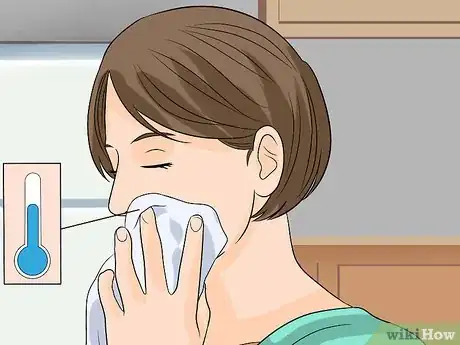


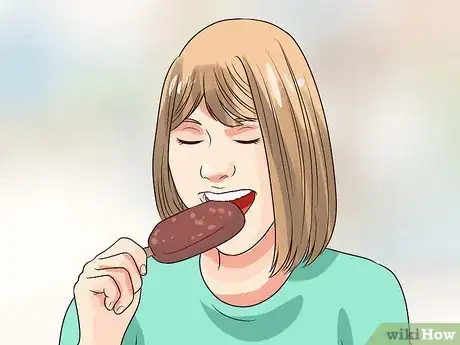

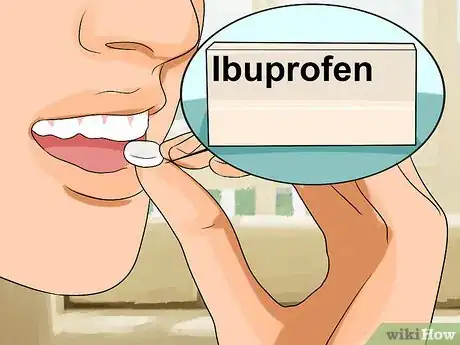
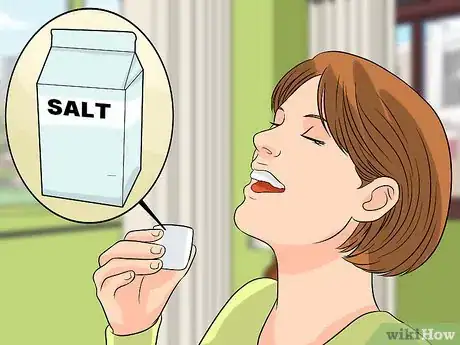
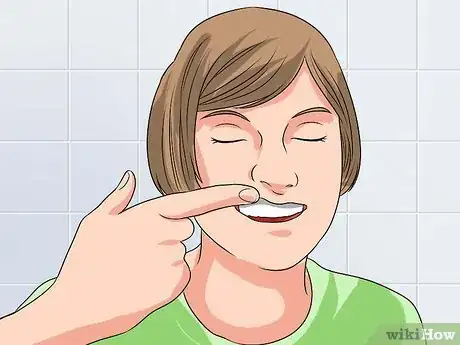
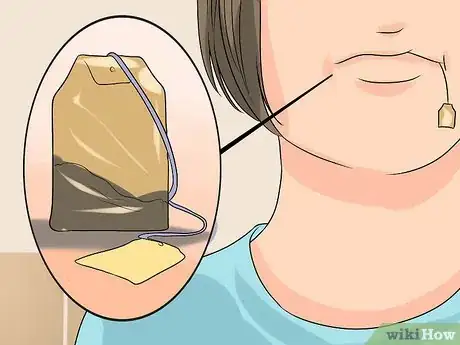

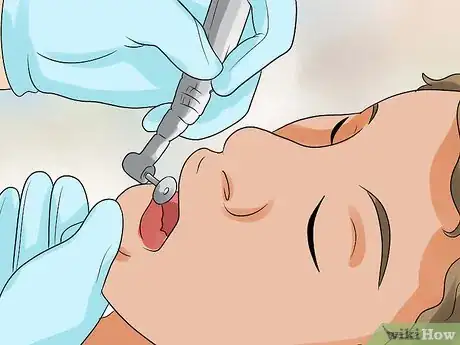
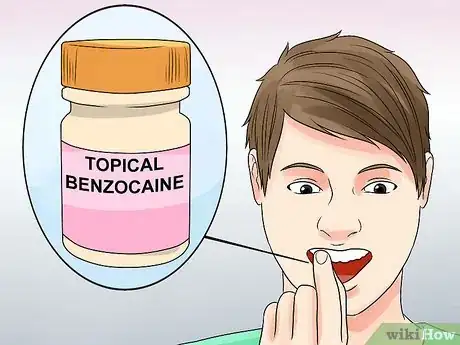
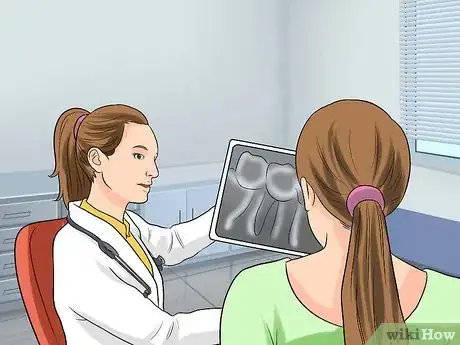





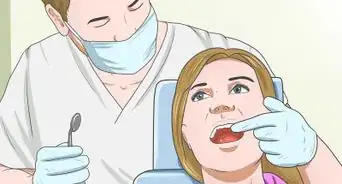
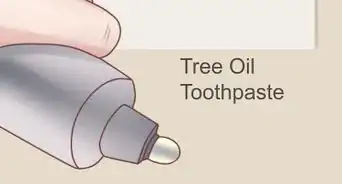





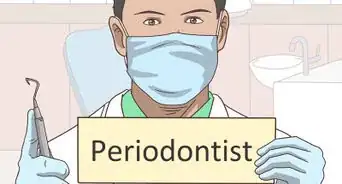














































Medical Disclaimer
The content of this article is not intended to be a substitute for professional medical advice, examination, diagnosis, or treatment. You should always contact your doctor or other qualified healthcare professional before starting, changing, or stopping any kind of health treatment.
Read More...